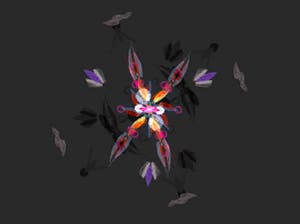Behold Lyst: The Nordic game jam on romance, love and sex
"The most natural human emotions are so complicated to imagine getting into a game."
Sex, love and romance are a huge part of being alive. But when it comes to video games it's largely unexplored beyond the surface level appeal of conventionally attractive bodies baring lots of flesh. Occasionally these themes are explored a little deeper in titles like Gone Home, Dys4ia, and Cibele, but rarely do they crop up in mainstream titles beyond as a mere window dressing for why our virtual heroes are slaughtering minions (be it for Link to rescue his beloved, Mario searching for his princess, Wander trying to resurrect his lover, or Travis Touchdown trying to get his end away). Lots of video games pay lip service to our more earthly urges, but few actually explore these in any meaningful way.
Enter Patrick Jarnfelt and Andrea Hasselager of the Copenhagen Game Collective, who've launched the government-funded annual game jam Lyst, an exploration of video games about romance, love and sex.
The state-funded Lyst network now consists of multiple Scandinavian countries banding together to promote gaming based around these topics. The Lyst Summit is a four-year venture into this fluttery realm with its inaugural conference having launched in Copenhagen in 2014, followed by a Helsinki, Finland summit earlier this year. A Norway event is planned for June 2016, and an epic finale will transpire in Sweden the following year.
"Such a big part of games out there are very one-sided and don't deal with topics like human emotions in a nuanced way," Hasselager tells me over Skype.
"It's all about seeing the status quo and then questioning the status quo and we have a discussion about it," Jarnfelt adds. "But discussions are not enough in our mind. We're an artist collective that's also a bit activist in the sense that we want to do stuff. So we felt it was important to do a game jam to show the world that it's possible to tackle these subjects in a constructive way."
This wasn't without its challenges. For the 40 odd years video games have been around developers have struggled with how to apply them to our lives in ways more illuminating than mere entertainment. Surely the medium has become an increasingly relevant touchstone in our culture, often containing political statements, personal dramas, and presenting us with challenging moral and ethical dilemmas. But when it comes to matters of the heart - or the loins for that matter - games are still very much in their infancy.
"When we started a lot of developers were like 'but I wouldn't know what to make,'" Hasselager tells me. "It's funny that some of the most natural human emotions are so complicated to imagine getting into a game."
"A lot of people are like 'you can't do that. You can't make Lyst because what if it's like a bunch of dudes getting together doing a rape game? It will ruin your career,'" she adds. "We were quite nervous."
Hasselager and Jarnfelt went to great lengths to prevent this sort of sleaze. Participants had to apply to partake in Lyst by writing an essay about what they hoped to achieve through the summit, and the participant count was intentionally kept slim at around 40 developers. This was to provide a more intimate atmosphere as the participants wrack their brains to come up with something bold, experimental and daring.
The setting for this creative incubator is important, and to that end Hasselager and Jarnfelt went all out on what their admittedly somewhat meagre budget could afford. The first Lyst was set on what Hasselager called "an old retired ferry" tethered to a Copenhagen dock for three days. The following Lyst was held on an remote island. One time the organisers even hired a masseuse to offer massages for the participants. "It was very important that we spend that public funding on massages," Jarnfelt jokes.
The games that emerge from Lyst are as varied and strange as they comes. Some are funny, others are serious; some are physical, others are digital; some are naughty, others are nice.

The winner of 2014's Lyst Summit was a game called Custody about two divorced parents trying to raise a child together. Played by two players across three devices, here's how it works: Each player takes the role of a parent playing a Bejeweled-like puzzle game on a computer. This is how you earn money - or, in other words, it's your job. The players' child is a tamagotchi-like character on a mobile device and the two players need to physically pass the child back and forth physically when prompted.
If you're not good at the Bejeweled-like game, then you'll be low on funds and unable to buy your child things like teddy bears and ice cream. And if you're really bad, you'll fail to cover your alimony payments and lose custody of your child altogether.
Focus too much on the puzzle game, however, and your child will feel neglected and prefer the other parent. Sometimes you'll find momentum in your work and attaining your offspring becomes a burden, at least momentarily. It's a catch-22 based on a very real scenario (one of the developers behind it was in the midst of a custody battle). Cruelly, when the game is over after a handful of rounds, the child's heart gets divided based on which parent it prefers. Sometimes it's very close, but there's always a victor.

That year the runner-up (by only one vote) was a pattern-matching game called Fever. Here, two people use one Xbox Gamepad to match shapes. Each button does something different and you need to simultaneously twist, rotate, move and match these shapes in a process so complicated that both players have to use both hands to correctly manipulate the controller. They'll also need to verbally communicate as they coordinate their efforts across the controller's various inputs.
"It's supposed to be like the first time you're having sex with somebody and you're trying to figure out ways to do it and not do it, and there's this communication that gets awkward as it goes on," Hasselager explains. "That's actually the conversation you'd have."
"It's a perfect digital game representation of how first time sex is," Jarnfelt adds. "Even the way you communicate sounds like it."
Sushi Hands is a likewise light-hearted affair for four to 16 players. It's a bit like musical chairs, only with hands, wherein players need to grab each other's paws to make abstract sushi formations on a timer. Each piece of sushi requires two or three hands to make and the same person can't use both hands in the same piece. You can find the exact rules and print out the instructions here.
"It's a very innocent game. You're just making sushi," Jarnfelt says. "So if you present it like that to people they're like 'okay, cool.' Then they start touching each other's hands and are like 'okay, this is actually kind of intimate.' On top of that, there are some pretty suggestive ones as well." Chopsticks, for example, has people scissoring each other's hands with fingers while Temaki merges penetration and spooning. "It's too much for most people," Jarnfelt laughs.
The Lyst winner from 2015 was a physical game called Surrender. A two-player competitive game played by three people, Surrender begins with a blindfolded person, the Sensor, standing over a line with one leg on each side. On each side of them is a person who must touch the Sensor's arm from the elbow down in a way they'll find pleasurable. The Sensor will move in the direction of whoever's touch they enjoy more. Get them to move their whole body over the line in your direction and you've won. If they don't like the way you're touching their arm, they'll make a fist encouraging you to stop and try something else.
There's plenty of room for outside the box thinking in this one too. Hasselager says that some players picked grass off the ground and used it to tickle their Sensor, while others implemented massaging techniques.
"It's talking about surrendering yourself to these people," Jarnfelt says. "It's about reading this person, so it's very much about consent and whether they like it or not. It's more like an exercise than a game, and you can use it in any sense, but it also opens up questions and it's an interesting experience when you're in it. One person felt complete abandonment in it because they were trying to caress their friend, the Sensor, and that friend started walking away strongly."

Feeling distraught over someone not liking your forearm-rubbing skills may seem silly (after all, it's not a skill you use in real-life), but that's the power of games: they make you feel real emotions over seemingly arbitrary challenges.
Not all Lyst entries are this playful, however, as some deal with altogether darker subjects.
Vil Du, for example, is not actually even a game, but rather software designed by a child psychologist in Holland to aide in communicating with children who have been abused. In Vil du, there are two connected devices showing the same child. When one person interacts with the child by selecting a type of touch and applying it to a body part on the avatar, it shows up on the other person's screen. At any point a player can say 'Stop!" if they don't like how the other person is touching their shared digital avatar.
On the surface this could be done with the doll. If movies and TV shows are to be believed, child psychologists usually whip out a doll and say "show me where they touched you." It's always upsetting. Vil Du isn't a video game in the general sense of the word, but it applies a game-like interface that children find engaging. "It's more game-y which makes them feel more detached from it and more able to talk about it because they're used to games," Jarnfelt says. "It's very hard to talk to these kids about their experience directly as it's a traumatic experience, but the kid distances themselves from their own experience by playing the game."

Vil Du can also be used as an educational tool about consent, but its primary purpose is to be used by medical professionals treating children. While spawned at Lyst, Vil Du has since received government funding to be developed as a real therapeutic tool.
Another one of Lyst's darker entries, The Blame Game, is a card game about two people trying to stay in a relationship by tearing their partner down. "For instance, you can ruin the contraception so she gets pregnant then she has to stay. Or looking through their emails and finding some dirt. All these horrible, horrible things that you shouldn't do in a relationship, but you do all of them. It's super satirical in that sense," Jarnfelt explains. "That questions all relationships, because maybe you do to some degree some of these things that you know you shouldn't, and this is just an extreme version of that."
After all, isn't a competitive game the perfect metaphor for an abusive relationship? You enjoy your opponent's presence - you need them to play, after all - but you're so invested in staying in the game that you don't realise how harmful your behaviour is.
Outside of Lyst proper, Jarnfelt and Hasselager are working on a risqué mindfulness app called La Petite Mort. Upon looking at a screenshot of it (below), La Petite Mort looks like a bunch of reddish pixels with deeper hues towards the centre along a vertical crevice. "That is a vagina that you have to pleasure," Jarnfelt plainly states.
"But we're not saying that anywhere. It's actually a mindfulness app when it comes out on Apple," he winks. "Everything is abstract. Everything is in a way sensual and erotic, but without being explicit in any way. So the sound is weirdly sensual and abstract. Some of it is very rhythmic, some of it is electronic. But then you build up this energy and pleasure this vagina. You have to do it at the right speed, of course. Not go too fast in the beginning. And at the end you reach a climax."
Hasselager notes that there are four different vaginas, each with a different musical composers putting their own spin on how they'd articulate an orgasm as a piece of music.

"You rub it and there's more sensitive areas and less sensitive areas and there's a really complex system behind it," Jarnfelt explains. "Each of these cells is intelligent and knows how much it's been rubbed and how sensitive they are. And you have to move around and do it in a way this vagina likes."
Jarnfelt was adamant that getting the abstract vagina to climax isn't actually the point and that there are no explicit goals in La Petite Mort. "We're trying to make a statement that pleasuring is not typically a more male-oriented, more goal-oriented thing [like] try to get a woman to have an orgasm. That's not the point," he says. "The point is the experience itself. Goals would go totally against that."
There will be one slightly game-y mechanic though in the form of Experiences, La Petite Mort's parlance for achievements. "In real life you have experiences," Jarnfelt says. "Like your first time is an experience. Like a giant tantric orgasm is an experience. So if you play the game multiple times and you play it differently then you can have this Experience or that Experience. But that made sense for this kind of game."
La Petite Mort was presented last month at Arse Electronika, a sex and technology conference in SF. But Hasselager and Jarnfelt didn't just present their experimental app. No, they took it one step further by having a room where vagina-sporting folks could get their genitalia scanned into the game.
"We wanted to make this as real as possible, so we wanted to have real people in the game," Hasselager says of this exhibit.
"Then I was digitising them and putting them in the game, so people could come up and play with themselves at the conference," Jarnfelt adds.
As is, Hasselager and Jarnfelt are crossing their fingers that Apple will accept La Petite Mort, as its true meaning is buried subtext. "Let's see if it gets accepted on the App Store," Jarnfelt mischievously ponders. "We're trying to push the boundary of what is accepted in general. What is accepted in society."
Speaking with Hasselager and Jarnfelt it's clear that the two have had no problem finding passionate participants in the Lyst Summit, but the question is: will these themes move beyond the experimental exhibition space and indie scene? Could the next Naughty Dog game or Ubisoft blockbuster tackle issues of sex, love and romance in a mature, gratifying way?
"My hope is that it is going to spread. That we'll start seeing more of these diverse sexual stories, love stories in more conventional games," Hasselager says. "I think it's going to happen. It's just a matter of a little patience and a lot of activism."
"If things need to change it often comes from the underground. And I really feel like we are doing something different here in Scandinavia. We're trying to push the boundaries."










